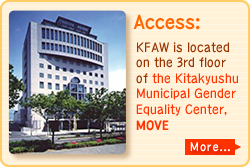| 1.Term | February 23 – March 2, 2014 |
| 2.Venue | the Philippines (Metro Manila, Orongapo City and Province of Zambales) |
| 3.Program | February 23 Dearture from Fukuoka and arrival in Manila February 24 Visit to the PREDA Foundation February 25 Visit to the indigenous Aeta MAO Community and homestay February 26 Feeding volunteer at the MAO Community February 27 Visit to a fair trade group Visit to the Women and Gender Institute, Miriam College February 28 Visit to the Crisis Center for Violence against Women and Children, National Breau of Investigation March 1 Visit to DAWN March 2 Dearture from Manila and arrival in Fukuoka |
| 4.Participants | 13 |
From February 23 to March 2, 2014, we held a study tour under the theme of “Learn International Cooperation in the Philippines,” with the focus on the country’s poverty, gender problems, and international cooperation. We had publicized this tour mainly in Kitakyushu, eventually attracting 13 participants. Although they were all different in terms of age, gender, and occupation, we feel that they were able to learn a lot from the tour.
The following is a report written by Ms. Mayumi IWAO, one of the participants.
Report on the KFAW Study Tour (Ms. Mayumi Iwao)
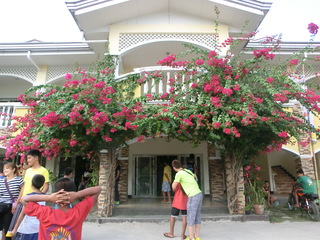 After arriving in the Philippines, we left Manila and headed to the PREDA Foundation, an NGO in Olongapo City. It took us three hours to get there by bus. Then, we rode a small bus called a jeepney, the popular public transportation in the country, and travelled to Home for Boys run by the foundation. The bumpy ride made me feel as if I had been riding a horse-drawn carriage.
After arriving in the Philippines, we left Manila and headed to the PREDA Foundation, an NGO in Olongapo City. It took us three hours to get there by bus. Then, we rode a small bus called a jeepney, the popular public transportation in the country, and travelled to Home for Boys run by the foundation. The bumpy ride made me feel as if I had been riding a horse-drawn carriage.
Social workers from the PREDA Foundation help children get released from a prison and give them support and education at Home for Boys. Most of these children were victims of cruel treatment such as sexual exploitation, or abuse/neglect by their parents. They had no choice but to simply become street children and steal food or money in order to survive. They ended up in jail, where they were abused by other inmates since these places are not made for kids but for adults. We need to realize these children are not perpetrators but victims of distorted social structures.  After an orientation, the staff showed us some rooms where boys were actually taking support programs. We first visited the Yellow Room, whose walls were covered with soft material. In this room, the boys can freely express their feelings such as anger, sorrow, and pain?the emotions that they cannot show anywhere else?while punching and kicking the walls. I thought this practice would help them feel better and learn how to control their emotions. This sight put me into deep thoughts. These boys live together in this friendly and open facility. They exchange jokes and look just like real brothers. After an exchange party with the boys, they showed me lots of animals and vegetables they were looking after. I hope that there will be a bright future for these boys.
After an orientation, the staff showed us some rooms where boys were actually taking support programs. We first visited the Yellow Room, whose walls were covered with soft material. In this room, the boys can freely express their feelings such as anger, sorrow, and pain?the emotions that they cannot show anywhere else?while punching and kicking the walls. I thought this practice would help them feel better and learn how to control their emotions. This sight put me into deep thoughts. These boys live together in this friendly and open facility. They exchange jokes and look just like real brothers. After an exchange party with the boys, they showed me lots of animals and vegetables they were looking after. I hope that there will be a bright future for these boys.
Next, we paid a visit to Home for Girls, another facility run by the foundation. We received warm welcome from the staff and girls under the care of the foundation, and watched a play adapted from these girls’ grueling past experiences. I could not put into words what I felt then, and wondered if it would be really all right for these young girls to watch such a realistic play drawn from their horrific and painful experiences of becoming victims of abuse and human trafficking committed by their own parents and relatives. It must be unbearable for anyone to face such a past. All children should feel loved by their parents or people around them. However, here in Japan as well, many children do not feel loved by their abusive parents. This issue is not just limited to the Philippines but applies in most societies in the world. Receiving necessary support and programs provided by the PREDA Foundation, the boys and the girls become strong enough to squarely face their past and learn how to control their emotions. Then, they can look toward the future.
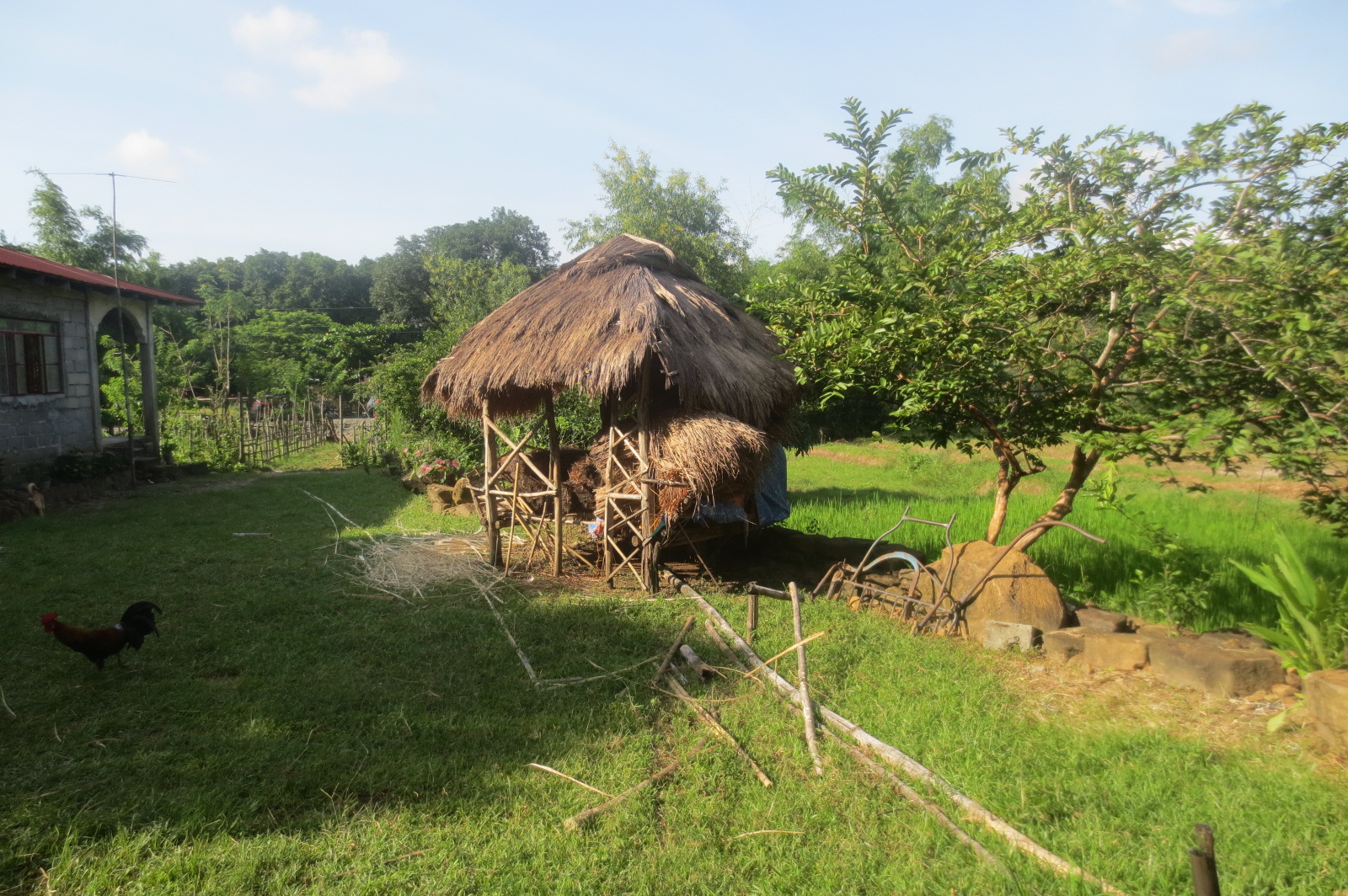 The next morning, we rode a jeepney again and headed to a local market. We bought vegetables,
The next morning, we rode a jeepney again and headed to a local market. We bought vegetables,
chicken, drinks, rice, snacks and more. These foods were for us and our host families. Yes, we
were going to stay overnight with Aeta families! It sounds so exciting, doesn’t it? We arrived in the MAO Community in the afternoon and had a session about the MAO Community. Then, we introduced ourselves. I said, “Ako si Mayumi” in Tagalog. I should have learned a bit more of the Tagalog language. I had a chance to talk to some of the host families, and at this point, I did not know who would be my host family yet. I found a lovely girl. She was very shy at first, but she held my hand after a minute. Later on, I came to realize that she would be my host sister. Lucky me! Her name was Cecil, and she was three years old. There were another two little kids in my host family and they were all so cute.
At last, we were introduced to each family, and that was one of the most exciting moments in this trip. One of my host sisters Paula, also aged three, came to call me. The family told me to rest first in a bamboo bunk bed. But as soon as I left my bag there, I decided to have more communication with my family. Somehow, the kids were very curious about me and peeking at me from the lower bunk. And when I went downstairs, my host brother Edmond was preparing dinner. He was really a good cook. My host mother Lita showed me around the kitchen. She spoke her local language, and her two daughters Monette and Claudia explained what mother had said in English for me. I heard that most people did not speak English in the MAO Community, but I was lucky to have my two high school sisters who spoke English so well?actually they spoke much better than me! Then they took me outside to show their newborn puppies, garden, vegetable field, pigs, pets, and pump well. After that, we had a good chat over a cup of coffee, and enjoyed watching TV. 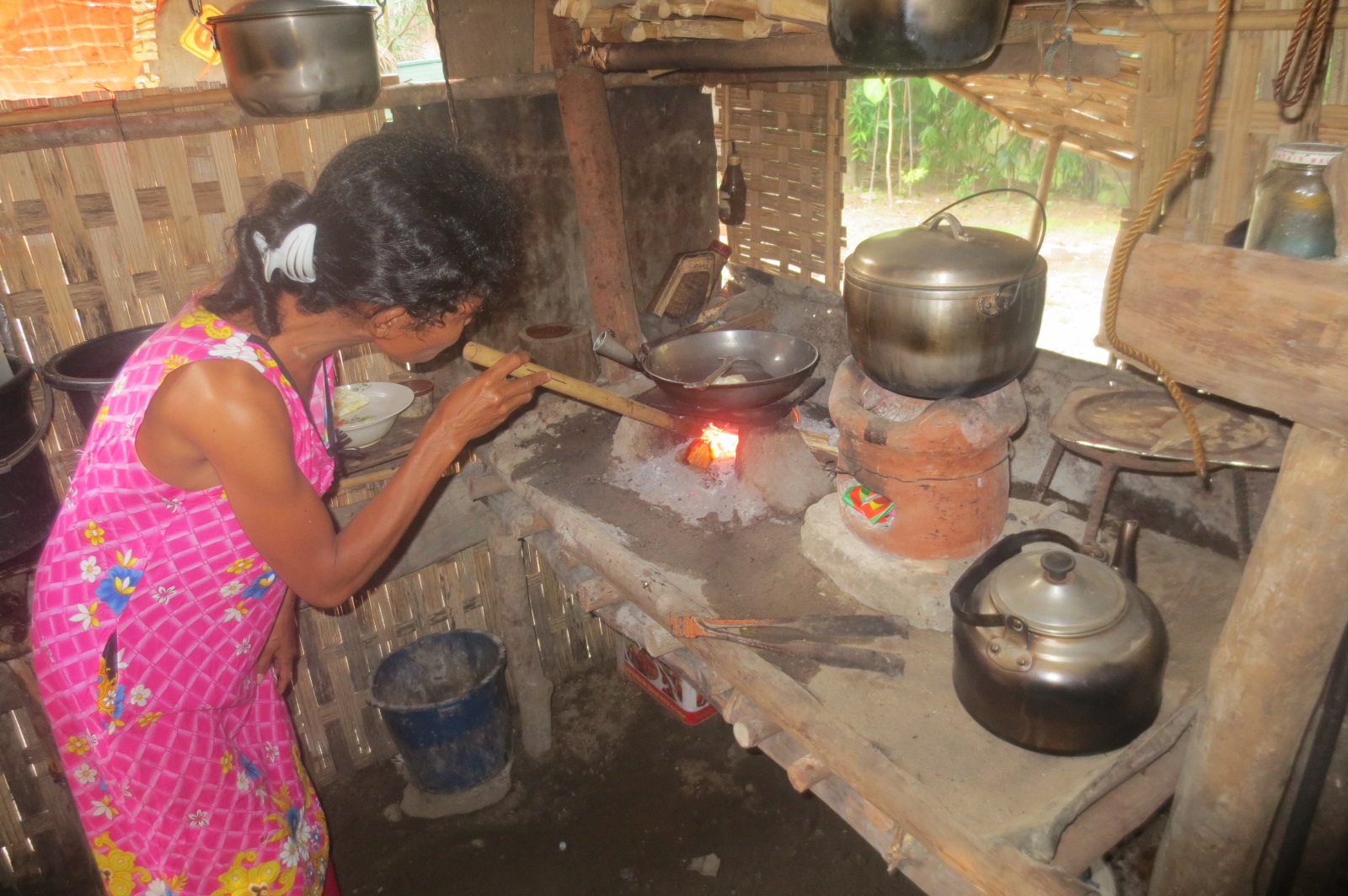
Although I did not understand any Tagalog on the TV shows, it was fun to watch it anyway. And it was a great feeling just being with my host family and their friends at home. Time was passing so slowly with such lovely people and I really enjoyed every moment of it. In Japan, people seem too busy to spend time with their families. I prefer how time passes in the Philippines to that in Japan. We had dinner prepared by my host brother Edmond, and everything was wonderful. We had rice, two kinds of chicken dishes, cooked vegetables, traditional Filipino soup, mango fruit and a glass of mango juice. Claudia told me that traditionally they eat with their hands instead of using a fork and spoon. I tried to do so, but it wasn’t easy to pick up rice since Filipino rice wasn’t as sticky as the Japanese one. The next morning, I tried to eat fried fish with my hands and did it very well, I suppose.
At 8 p.m., we gathered together at the center of the MAO Community and enjoyed a big party night. Although the community had electricity, it was pitch-dark outside as there was no neon lighting. We walked to the party venue with a flash light under a night sky full of twinkling stars. They showed us their traditional bamboo dance, and kids sang some songs for us. I was so impressed. In return, we sang the “Sukiyaki Song”. These cultural exchanges truly strengthened our bonds.
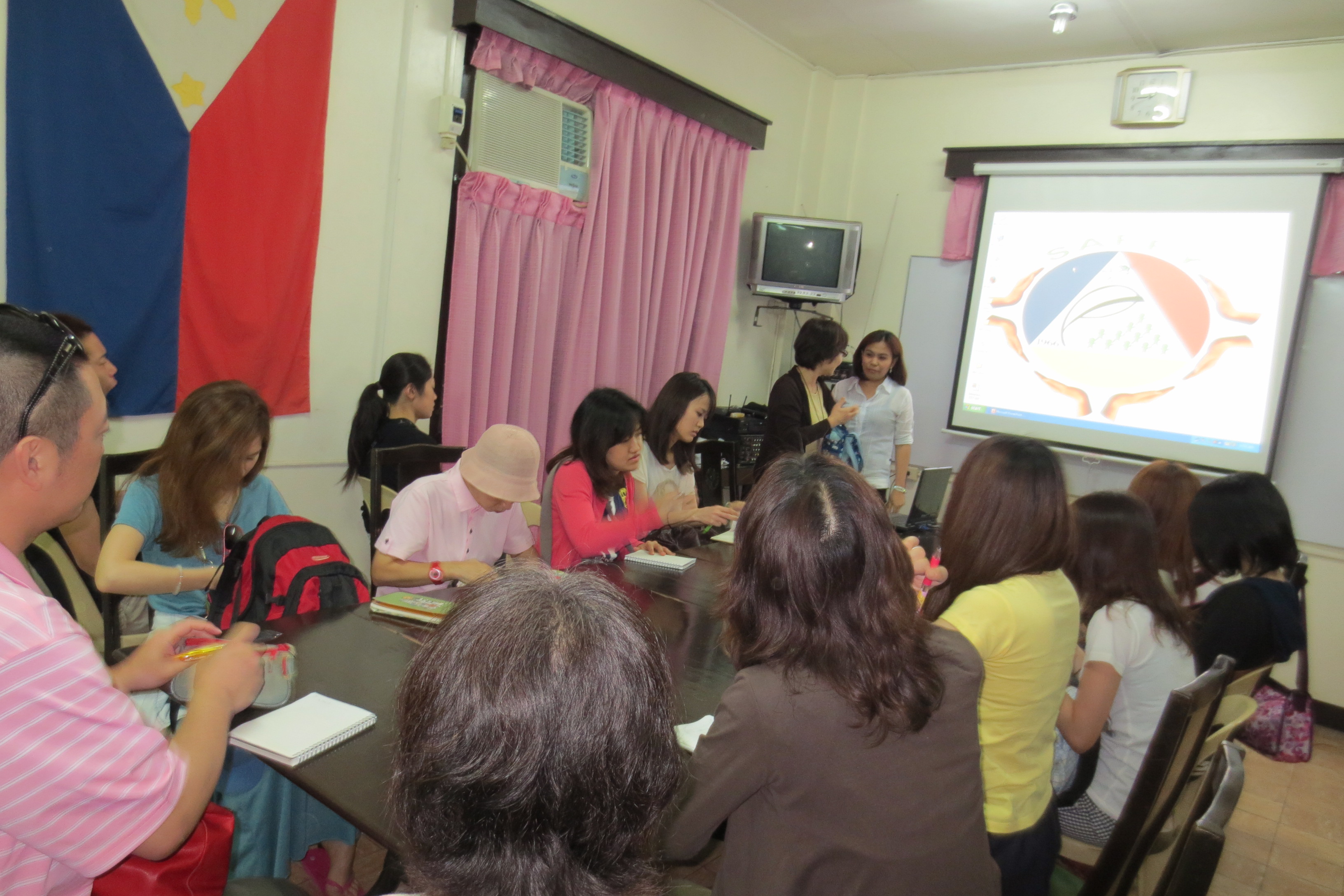 On February 27th, we visited the SAFRUDI (Social Action Foundation for Rural and Urban Development, Inc.) and SAFFY (Social Action for Filipino Youth) for fair trade. We were lucky to meet some leaders of producers from different communities. These groups were established to eliminate one-sided exploitation of developing countries by advanced countries and facilitate fair trade.
On February 27th, we visited the SAFRUDI (Social Action Foundation for Rural and Urban Development, Inc.) and SAFFY (Social Action for Filipino Youth) for fair trade. We were lucky to meet some leaders of producers from different communities. These groups were established to eliminate one-sided exploitation of developing countries by advanced countries and facilitate fair trade.
The move first started in Europe in the 1960s, and is now expanding worldwide with the U.S., Australia, Canada and Japan as major advocates. Some organizations in Japan are earnestly engaged in promoting fair trade. After receiving an orientation, we visited a store called Mano Mano to see fair trade commodities actually marketed in advanced counties. I bought a lot of banana chips and stationery for souvenirs.
In the afternoon, we went to Miriam College. We attended a lecture on women’s studies at WAGI (Women and Gender Institute) for three hours. The lecture was mainly about gender issues. Japan is far behind when it comes to the empowerment of women. I remember that every time the gender discrimination was mentioned, it was Japan that students cited as a bad example when I was an international student at the University of Wollongong, Australia. My Aussie classmates often said, “There are very few female politicians in Japan,” “Female employment rate is low,” “It is difficult for women to return to their full time jobs after marriage and childbirth,” etc. And to my regret, that is very true!
The latest Global Gender Gap Index, a comprehensive measure of gender equality, places Japan at 105th whereas the Philippines at fifth, the highest ranking in Asia. Looking at the situation in terms of gender equality, I think Japan should learn a lot more from the Philippine society.
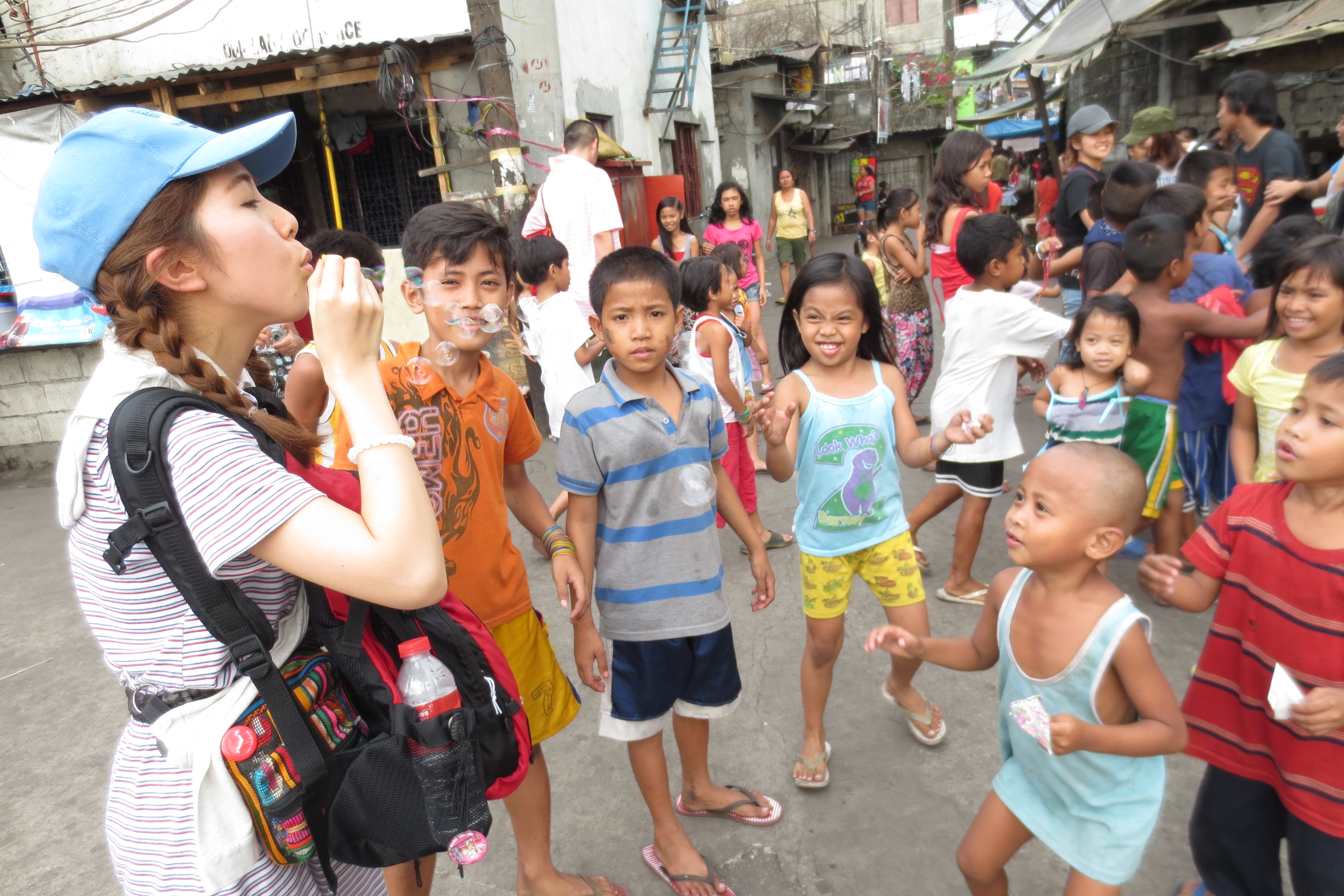 On February 28th, we visited a slum area in Navotas city, and were given an opportunity to sell food at a stall on the street. How lucky! We sampled some. It was sticky rice rolled in banana leaf. Wherever I went, children smiled at me and that made me quite happy.
On February 28th, we visited a slum area in Navotas city, and were given an opportunity to sell food at a stall on the street. How lucky! We sampled some. It was sticky rice rolled in banana leaf. Wherever I went, children smiled at me and that made me quite happy.
I met so many friendly and nice people there, and I miss everything and everyone in the Philippines. I thank all the people I met during this study tour and would like to close this report by introducing what my Filipino friend said 23 years ago–of course, we have been friends ever since and were reunited during this study tour: “I remember Japan because of you.” The Philippines means a lot to me because I have special friends there. I renewed my determination to keep myself engaged in this country.
Opinions and Comments from Other Participants
- Even though the study tour lasted only a week, I was able to obtain standard information on global social problems. It was a good opportunity for me to start thinking about international cooperation.
- I was able to visit many places that I could not have done on a private tour. Also, I was able to observe the reality of the Philippines that I would have overlooked on an ordinary tour.
- The tour gave me many opportunities to interact directly with local children and adults, making me feel the reality of the Philippines. I am happy that local people welcomed me as a close friend, rather than as just a sightseeing visitor from a rich country.


